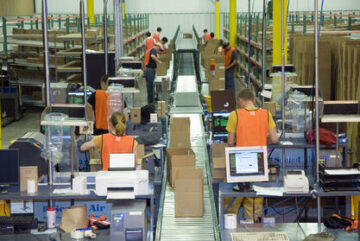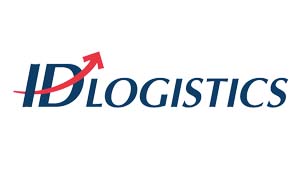It’s fair to say that safety is in the news a lot these days. For companies, like Kane Logistics, that specialize in food and beverage logistics, warehouse food safety is a 24/7 obsession. We talked recently with Lora Cumbie, KANE’s Director of Quality and Compliance, to understand how KANE helps its food-industry customers operate safely and in full compliance with regulating agencies.
Q: What are your responsibilities at KANE?
A: I support KANE’s warehousing and packaging operations, as well as our customers, by being the technical expert on quality and food safety. There are numerous standards and regulations that must be followed and we make sure these standards are documented and followed.
 Q: Is food safety more important these days?
Q: Is food safety more important these days?
A: Thanks to the media, social and otherwise, bad news spreads fast and companies can suffer huge financial losses when illnesses are traced back to poor food safety practices. We saw that with Chipotle a few years back. It’s one of the reasons quality roles are becoming more important in the supply chain. Today, many universities offer degrees in food science and quality assurance. These degrees didn’t exist 20–30 years ago.
Q: Has COVID-19 elevated the importance of food safety in the warehouse?
A: For sure. The truth is we’re not yet certain how the virus impacts the supply chain, but certainly we’re monitoring possible virus transmission during the handling process. We’ve also got more chemicals in facilities now as we mandate frequent hand-washing.
Q: You mean hand sanitizers can compromise food safety?
A: It’s ironic but, yes, sanitizers are chemicals and we need to ensure that these chemicals can’t make people sick after products leave the DC. It’s less of an issue for KANE since all the food we handle is already packaged. But it’s something we need to monitor.
Q: Are 3PLs more under the regulatory microscope today than in the past?
A: Yes. Years ago, regulating agencies focused primarily on manufacturers, but now they are looking hard at logistics companies because they realize there are a lot of touches between the factory and the store shelf or restaurant. Food-industry 3PLs are now being required to adhere to strict standards like the GFSI.
Q: The GFSI?
A: It stands for The Global Food Safety Initiative. The GFSI oversees and approves different auditing platforms as meeting the organization’s demanding criteria for food safety. Companies, like KANE, that are certified to GFSI standards can immediately show customers and potential customers that its plants operate with an effective food safety program. KANE also voluntarily solicits audits from AIB International to confirm proper warehouse safety and sanitation practices are in place and working.
Q: Does a role similar to yours exist at all 3PLs who work with food companies?
A: This role does not exist at all food industry 3PLs, but you’re more likely to see it than you were even 12 months ago.
Q: Is KANE’s approach to warehouse food safety and quality different?
A: I think it’s more hands on. I oversee quality and compliance for dozens of facilities, but each facility has an on-site quality representative chosen by the site leadership. I work closely with these representatives and the DC managers to develop the processes and procedures at each site, some of which are customer-specific. I’ve seen other quality leaders that are more office-based and simply churn out processes and procedures to meet a regulatory requirement. While that’s part of the job, it’s naïve to think that just because you’ve handed down a procedure from corporate that it will be followed. Follow up internal audits and training are necessary to ensure adherence to the standard. To make safe and clean work, you’ve got to get your hands dirty.
Q: Tell me about the internal audits.
A: These warehouse food safety audits are done monthly by a team of internally trained people. They take 3–4 hours and are essentially designed to uncover potential areas for food contamination. We follow an audit checklist – for things like safety procedures, maintenance and document control – and observe whether procedures are actually followed. KANE’s approach is not a “set it and forget it.” We’re on it constantly.
Q: Do you ever interact directly with customers?
A: Yes, regularly. Typically, I am talking to my counterpart – the company’s quality director – during a start-up process to ensure full alignment on the customer’s specifications and standards.
Q: So, the requirements are not always the same based on FDA and other regulatory requirements?
A: No. There are general standards and company-specific standards. In a former job, I had one customer that required sites to have different color hairnets for associates on the warehouse floor in order to distinguish between full-time and temporary workers.
Q: What role does technology play in warehouse food safety?
A: Shelf life limits require an advanced WMS that can manage to any stock rotation protocol (FIFO, FEFO, LIFO, etc). Also, in the event of a recall, it’s obviously critical to have systems that can quickly trace the source and final delivery points of products, down to the lot number. These are table stakes. But frankly, in the quality world, most companies are playing catch-up when it comes to technology. It would be great if warehouse food safety audits were recorded on a tablet with accompanying photos. Or if documents were managed electronically for rapid routing and approvals. In the past, it was rare to see major technology investments directed toward quality assurance. But that’s beginning to change.
Q: Any closing thoughts?
A: In the 3PL world, customers want consistency. They know that quality equals consistency, so they like to see roles like mine that are laser focused on consistent execution of food-safety procedures on the warehouse floor or packaging line. The bonus is that anytime you improve quality and consistency, you also reduce costs.
Source: https://www.kanelogistics.com/blog/warehouse-food-safety-quality-and-compliance
- "
- All
- audit
- auto
- BEVERAGE
- Black
- change
- chemicals
- code
- Companies
- compliance
- Costs
- COVID-19
- Customers
- dc
- delivery
- develop
- Director
- documents
- Effective
- etc
- Event
- execution
- Facility
- factory
- fair
- FAST
- fda
- financial
- follow
- food
- full
- General
- Global
- great
- Hand Sanitizers
- Handling
- How
- HTTPS
- HubSpot
- huge
- industry
- Initiative
- Interview
- Investments
- IT
- Job
- laser
- Leadership
- Line
- logistics
- major
- Media
- monitoring
- months
- news
- offer
- Operations
- order
- Other
- packaging
- People
- plants
- Platforms
- poor
- Products
- Program
- quality
- reasons
- reduce
- regulations
- Requirements
- restaurant
- safe
- Safety
- Science
- Sites
- So
- Social
- standards
- Start-up
- stock
- store
- supply
- supply chain
- support
- Systems
- Tablet
- talking
- Technical
- Technology
- temporary
- The Source
- Training
- uncover
- Universities
- virus
- Warehouse
- Warehousing
- WHO
- WMS
- Work
- workers
- world
- years









